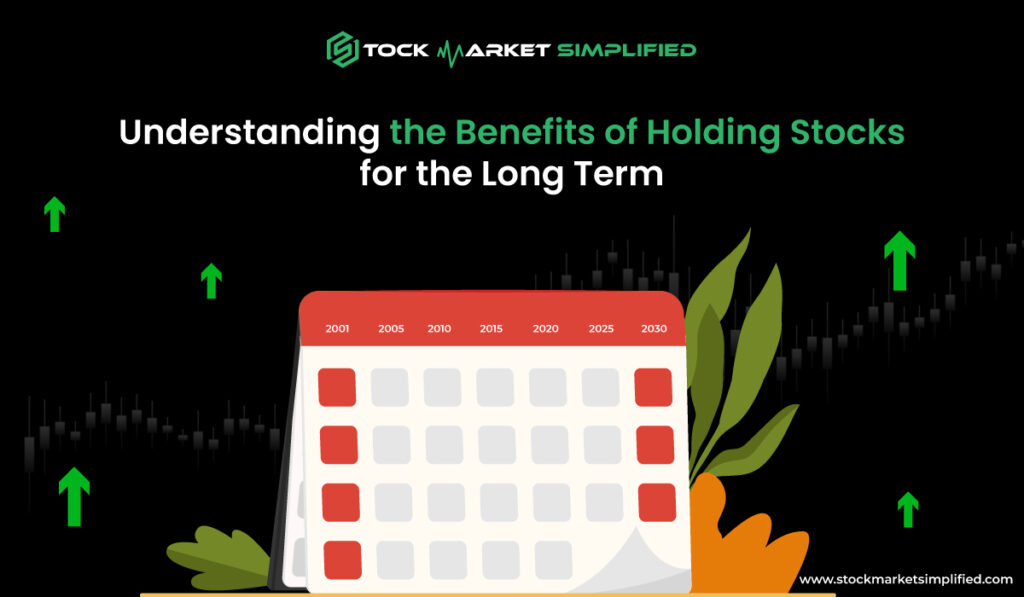Understanding the Benefits of Holding Stocks for the Long Term

Introduction
As an investor, it is possible to get consumed by the charm of short-term trading gains. However, short-term trading requires many skills and complete knowledge of the stock markets. Without proper knowledge, you are more likely to lose money in the short term.
So, what alternative can help you build wealth from the stock markets? You can make long term investments in stocks. But, is it worth it? Is it more beneficial to go for long term investment? Which are the best long term stocks you can look out for?
Don’t worry. We will discuss everything you need to know about holding stocks for the long term, in this blog.
Why Long Term Investing Matters?

Let’s start by answering, what is long term investing? Long term investment in stocks refers to buying a stock and holding it for years or decades. Traditionally, if a stock was held for more than 3 years, it was called a long term investment.
However, with changing times and technological transformation, everything has become fast-paced. These days, a stock held for more than 1 year is considered a long term investment. But, if you really want to reap the benefits of investing long term, you should hold the stock for multiple years.
Why long term investment matters? Here are the reasons:
- More Stable: Stock prices follow trends and news in the short term. Prices are more volatile as a result and it is difficult to predict how the stock will react. Investors can also get trapped in the swing of the stock price. However, in the long term, the stock prices are bound to grow with the company’s growth.
- Growth: While short-term trading is like speculation, holding stocks for the long term is like investment. As the company in which you have invested grows, the stock price also rises. With patience, you can grow your wealth without worrying about daily fluctuations.
- Less transaction costs: Every transaction attracts costs like brokerage, STT, and other charges. If you carry out multiple trading transactions in a day, you end up paying more costs. Holding stocks for the long term only attracts transaction costs twice.
- Save Taxes: Taxes on long term investments are lower compared to short-term trading. This is because trading is purely speculation. Tax at a reduced rate is chargeable on long term investments only if the gains are more than Rs. 1 lakh in a financial year.
Also Read: Top 5 Stock Market Strategies for Long-Term Growth
Understanding Long Term Investments

Now you would ask, how can you understand whether or not a stock is fit for long term investment? In the long term, consistency is the key. So, a company that is consistently growing over the past years should be your preferred pick. However, you should also check for the following conditions to identify the best stocks to buy for the long term:
- Strong Fundamentals: Fundamentals can be analyzed by studying the financial statements of a company. Here’s what you should look for:
- Consistent growth in Profits: Not only the company should have consistent profits, but the EPS should grow every year.
- Operating Cash Flows should be positive: A company with positive operating cash flows is liquid enough to navigate tough times.
- Ratios are good: All important ratios like the D/E ratio, leverage ratios, coverage ratios, etc. should be favorable for the company.
- Competitive Edge: The company should have a competitive edge over its peers. Customers should prefer its products over the competition.
- Market Leadership: The best long term stocks are always market leaders. They offer stable and consistent returns.
- Capable and Clean Management: The management should have capable leaders who are not guilty of legal or tax offenses.
Some of the best stocks to buy for the long term in India that adheres to the above are:
- Reliance Industries Limited (RIL)
- TCS (Tata Consultancy Services)
- HDFC Bank
- State Bank of India (SBI)
Benefits of Holding Stocks for the Long Term

What are the benefits of holding stocks for the long term? Let’s take a closer look at it:
Compounded Returns
Just like returns on a long-term FD are more than the interest rate due to compounding, stocks also provide compounded returns. How the best long term stocks can help in compounding your returns? Let’s see:
- Capital Appreciation: As the price of stock rises in the long term, your capital appreciates.
- Regular Dividends: You get regular dividends that can be reinvested into the stock. It gives similar effects like interest on interest.
- Bonus Shares: Companies also issue bonus shares from time to time to keep their stock price affordable. This adds to your capital free of cost.
Long term investment in stocks helps you compound the returns on multiple levels.
Lower Taxes
The Income Tax Act, 1961 charges long-term capital gains from stocks at a lower tax rate. This tax is not charged if your long-term capital gains are less than Rs. 1 lakh in a financial year.
Regular Dividends and Bonuses
The best long term stocks pay regular dividends and bonuses as payouts to their long-term shareholders. While bonus shares directly become a part of your portfolio, you can reinvest the dividend amount to compound your earnings.
Lower Risk
In the short term, stock prices are bound to fluctuate. But, in the long term, quality stocks are bound to grow.
The Power of Compounding Returns

Let’s take an example to understand how compounding words for stocks. You buy 100 shares of company A @ Rs. 1,000 per share.
| Particulars | Calculation | Amount (in Rs.) |
| Initial Investment | 100 x 1000 | 1,00,000 |
| Year 1 – 20% Price Appreciation Closing Price of Stock is Rs. 1,200 Dividend Rs. 120 per share (Reinvested. Shares bought 10 @ Rs. 1200) Total Investment at year-end 110 @ 1200 | 100 x 1200 100 x 120 | 1,20,000 12,000 1,32,000 |
| Year 2 – 20% Price Appreciation Closing Price of the Stock Rs. 1440 Closing Value without Dividend The compounding effect of dividends in 1 year | 110 x 1440 100 x 1440 10 x 1440 | 1,58,400 1,44,000 14,400 |
You can see in the example, there is double compounding. The stock price growth is compounded and dividend also adds to the power of compounding.
Volatility vs. Returns
There is no direct link between volatility and returns. If you want to make long term investments, you should not worry about short-term fluctuations in prices. Here’s why:
- Noises drive short-term prices: Noises drive market sentiments that lead to price fluctuation in the short term.
- Performance drives long-term prices: In the long term, all odds get neutralized and only performance drives the stock prices.
So, don’t think twice before holding stocks for the long term if you are confident about the company. Investors who held tight in the market crash of 2008 led by the subprime crisis are now sitting at historic profits. Even the scare of COVID-19 and worldwide lockdowns couldn’t drive the markets down in the long term.
Best Types of Stocks for Long-Term Holding

Now that we have discussed the benefits of long term investment at length, let’s discuss which are the best stocks to buy for long term. Here are the sectors you can look into in the Indian context:
- IT Sector: Companies that are researching and diversifying into cutting-edge technologies like AI are most likely to grow in the long term.
- Banking Sector: Banks in India have huge customer bases and keep growing at faster rates every year. The prospects of the sector are bright.
- Consumer Goods: India has a growing population and the demand for consumer goods is only going up. Hence, you can invest in them.
- Infrastructure: The govt. Is promoting infrastructure development like never before. You can invest in the infrastructure sector for long-term.
Also Read: Top 10 Mistakes New Investors Make in the Stock Market
How Long to Hold for Long-Term Status?

There is no set rule to define a short-term or a long term investment. For industries that change very rapidly, even 1 year is considered as long term. For some more stable industries, even 5 years can be considered as long-term.
However, on average if you invest at least for over 3 years, we can say that you are holding stocks for the long term.
Although, it is advisable to decide your investment horizon based on the prospects of the business, for income tax purposes, the long term means more than 1 year.
Conclusion
Long term investment in stocks is the best strategy if you don’t want to hustle every day to ride the tide. Investing is like watching a race sitting as a spectator. Though you have a bet on it, you are not participating actively. Investing in companies with strong fundamentals can help you grow your capital with the benefits of compounding. Identify the best long term stocks and start your journey!

 Instagram
Instagram 





